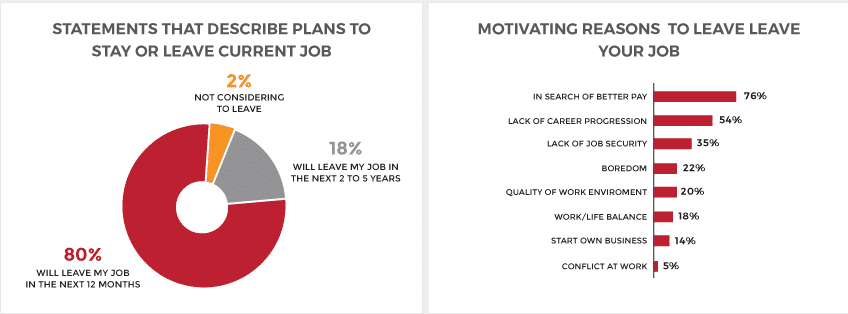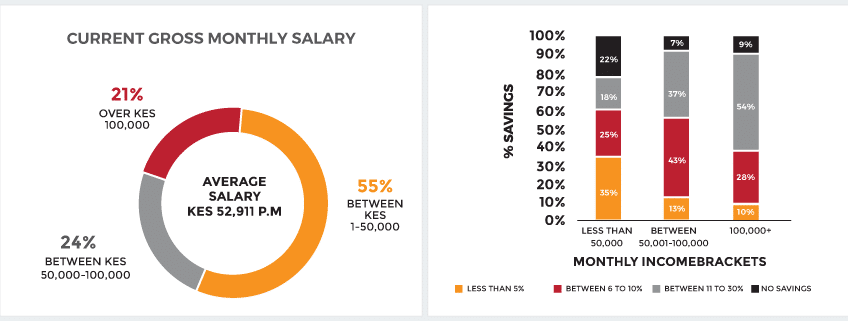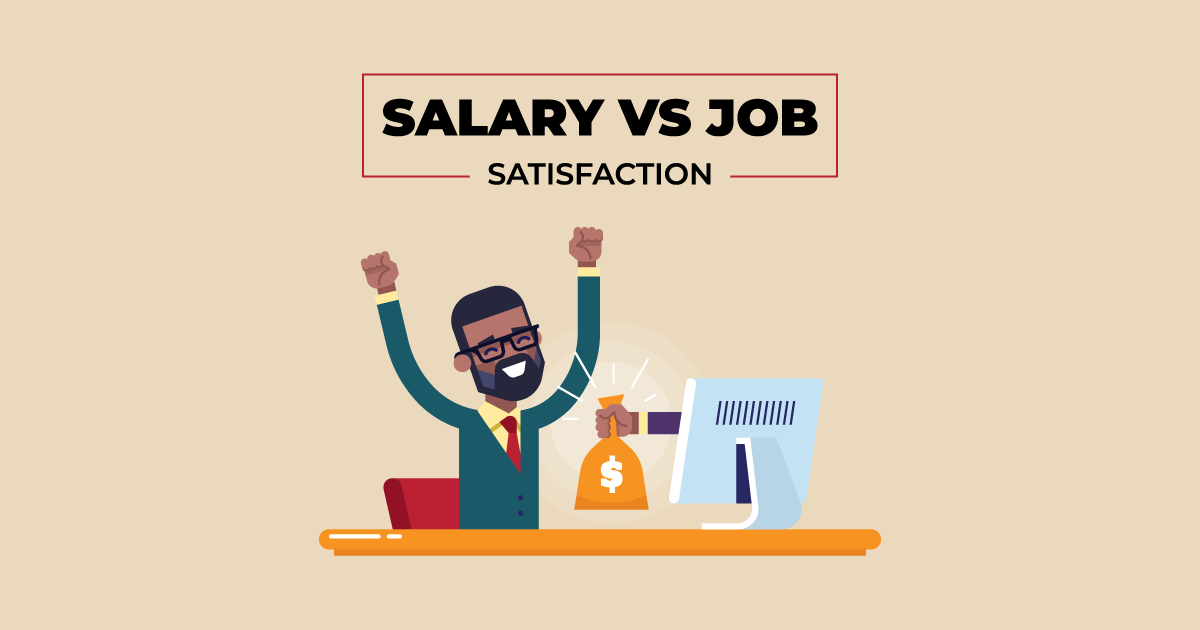It is clear that a high salary and job satisfaction are high up in factors to consider when choosing a career. Sometimes, however, they may not come as a package and you have to make a choice. Some people feel satisfied with a high salary even when they do not like what they are doing, while others are happy doing what they are passionate about even if their monthly account balance isn’t where they would want it to be.
Having a good job is great, but is it paying you what you think you deserve? If your salary range is acceptable, does your work excite you? Do you like the culture at work? Do you get excited at the start of each day, or do you have to drag yourself to work, constantly asking yourself if the job is worth it?
Table of Contents
Why People Change Jobs
Different people leave jobs at different levels of their career for various reasons. A study by BrighterMonday revealed the reasons why employees leave their current employer as shown below.

It is not surprising that the lure of a higher salary is top in the reasons why employees leave companies in Kenya, considering that over 50% of working individuals get a gross monthly salary of 50,000 and below.

Personal Factors that Determine Choice of Salary Vs Job Satisfaction
What are your current responsibilities?
Responsibilities have a way of defining our roles and lifestyles, both at work and in our daily lives. In this case, it is natural to place more importance to money as compared to job satisfaction. Think of Maslow’s hierarchy of needs. You need to satisfy the most basic needs before moving up the ladder to begin thinking of job satisfaction. Once your basic needs are in a stable zone, you now begin thinking of factors like work-life balance and office culture.
Level in Your Career

Young people are often more concerned with how much they get paid and not so much about how happy they are in a particular job. A report by BrighterMonday concluded that more employees above 40 years were more satisfied with what they do as compared to younger ones who were likely to leave a certain job or company for better pay. This means that as individuals grow, they tend to focus more on what they love as compared to the salary they receive from their work.
The Stage You Are in Your Life
It is easier to consider a high salary rather than satisfaction at your job when all you need to take care of is yourself. This is the reason why an individual who has no extensive budget, is likely to prefer happiness at his job, more than the salary he receives while someone who has an established family will consider the aspect of job security and financial status.
Personal Values and Principles
In every job setting, different individuals have different ideologies that they hold dear to them. For instance, someone may choose to turn down a high salary once they realize that the job in a way could tamper with their own path of happiness. This could be in a case where someone would consider factors such as his/her religion, political stand or personal principles more important than the high salary they stand to receive.
These are some of the few factors that influence how an individual’s salary relates to the satisfaction they get from doing what they love. Ideally, having a high paying salary for what you are passionate about is a sign of success and career fulfillment. It is not always the case though, therefore finding a way to be happier with your salary and your job can be a way to solve the two. Here are the pros and cons of salary vs job satisfaction:
Salary: Pros

Financial security: Salary automatically translates to better financial security. Let’s think about it, who doesn’t want that? Knowing your bills are always catered for will always guarantee that you will stay in that job, regardless of whether you enjoy it or not.
Work motive: When you understand that you will always receive your salary for completion of a specific task, chances are you will ensure the targets of the job are met. Additionally, in a company that recognises effort, it is more likely to work smarter to help you get the compensation as money matters a lot to you than job satisfaction in this point of your career.
Cons
Stagnates ambition: Once you set yourself up just for the money, chances are your ambition and passion will take the back seat and watch you get paid for what you do. You will remain focused on getting that salary every month with no opportunities to go after your interests, making you redundant and non-progressive.
Work Stress: Getting paid for work gives a good feeling, but what if you have to drag yourself to work every morning so you can be at your desk in time and finish your daily tasks? If you don’t enjoy what you do, any extra information on your daily activities can prove detrimental to your flow of work as you have to tune your mind into accepting extra work.
Job satisfaction: Pros

New avenues for growth: Every day is a new opportunity to learn something new, as you constantly aspire to get new innovations on what you do. Passion drives the desire to get new inventions as you desire to make your work easier and more interesting. Imagine if you find a new way to tackle a challenge every other day, would you trade it for anything else?
Career fulfillment: Doing something you love brings satisfaction to your career as every day, you find meaning in what you do. If the cheques stop coming in, are you still willing to do that job? Some people would rather take on a job they love and work themselves upwards for a better pay. If you love what you do, you would do it even if money was not an option, and if you don’t feel satisfied with your work, you will only do it “for the money”
Cons
Success takes time: Being happy with what you do can definitely be fulfilling. However, how will you pay for those bills at the end of the month? For instance, if you are passionate about the writing or art industry, getting to a financial breakthrough may take time, and if you have no other avenues for meeting your financial targets, job satisfaction can be adverse and thus the salary factor comes in.
Value of input may not be enough: imagine, you finally got that job you always wished you would get and would do anything to stay for it. However, the amount of input you have on the company as compared the output you get is not as per your standards. This can divert your attention and slow down your progress.
So, there you have it
What if you might have a well-get a high-paying job but constantly feel stressed at work, or the culture of the company is off. Your chances of hopping from one job to another increase. is higher than someone doing the same job they love, even sometimes with a lesser pay. However, this does not mean that you have to get stuck in a particular situation and struggle to attain your financial goals. Considering both sides of the approach can help you to make the right career choices, dependent on what works for you.
So, would you rather have job satisfaction or a high salary?





